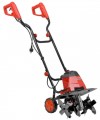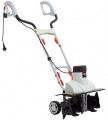Working width
The maximum width of the strip of land processed by the machine in one pass.
The large width makes it easier to work in large open areas, allowing them to be dealt with faster. At the same time, it is easier to deal with bottlenecks and hard-to-reach nooks and crannies with a small working width — a large unit may simply not fit where a smaller one will pass without problems. So it is worth choosing according to this indicator, taking into account the features of the planned work. If we talk about specific numbers, then in the smallest models the capture width
does not exceed 50 cm, in the largest it can be
1 m or more, a value
from 50 to 75 cm can be called average, and
from 75 cm to 1 m — above average.
Also note that some models allow you to expand the processing width by installing additional cutters. However, note that the wider the band, the more power is needed for efficient operation. It is believed that for the full use of the two-wheel tractor, it must produce at least 1 hp. for every 20 cm of width; however, for loose soils and shallow depths, smaller values are sufficient.
Working depth
The maximum processing depth provided by the unit. In cultivators with non-replaceable cutters, this parameter is determined primarily by the cutter diameter, in walk-behind tractors designed for active cutters (see below) - by design features (in such models, even high power does not guarantee a large working depth). The most limited indicator in modern walk-behind tractors is
up to 20 cm, and a value
from 21 to 25 cm can be called small. However, often even such capabilities are quite sufficient. A depth of
26 to 30 cm already provides quite extensive capabilities, and the most advanced models are capable of "biting into the ground"
more than 30 cm.
In any case, the optimal processing depth depends on the type and condition of the soil, as well as the crops for which the soil is being prepared; detailed recommendations on this matter can be found in specialized sources. So it does not always make sense to look for a model with maximum depth - especially since such capabilities require high power. It should also be noted that in many units the depth can be adjusted.
Speed rotation
The speed of rotation of the cutters provided by the two-wheel tractor in normal operation. For models with several gears and, accordingly, several speed options, this paragraph usually gives the maximum speed.
The value of this parameter directly depends on the type of cutter used in the two-wheel tractor. In models with active rototillers (see below), only the intensity of cultivation and the degree of crushing of the soil depend on the rotation speed; it is believed that it should be at least 270 – 280 rpm. And in motor cultivators, where the cutter is installed on the power axis of the unit (the so-called axial structure), the overall speed of movement will also depend on its speed — and it should not be too high, otherwise the user simply will not keep up with the unit. In such models, manufacturers select the rotation speed depending on the diameter of the cutter so that the speed of the machine in the end is less than 6 – 7 km/h. Therefore, in large motor cultivators, the rotation speed usually does not exceed 130 rpm, and in compact battery models with small diameter cutters, it can reach 300 rpm and even more.
Noise level
The maximum noise level produced by the cultivator / two-wheel tractor during operation. A noise of 70 dB is comparable to a very loud conversation, 80 dB to a busy city street, 100 dB to a production shop. The lower the noise level, the more comfortable the use of the unit for the operator himself and the less inconvenience it causes to others.

